Monday, 3 August 1998
Dunhuang, Gansu, China
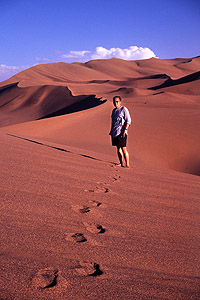
(Dunhuang, Gansu, China)
The train ride to Dunhuang in a soft sleeper compartment was very pleasant. We were woken up just before the train station and then piled into a bus at 0400 to do the two and a half hour trip to Dunhuang, which I slept through. Once we had arrived and checked into a hotel we found a bus for the Mogao Caves and negotiated a price. The caves themselves are amazing, not for the artistry which is excellent in some caves but a little dull in others, but for the scale. There are about five hundred caves and walking along them with your guide showing you the major ones you become aware of just how long it took and how many people were involved in their construction. Although the two huge Buddhas are impressive (one is 34m high) the best cave has to be that of the sleeping Buddha which depicts Sakiymoni reaching the state of Nirvana whilst his disciples look on.
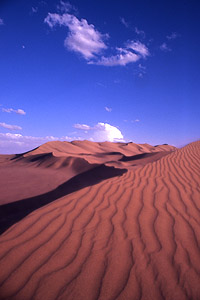
(Dunhuang, Gansu, China)
After sleeping for a couple of hours we then went to the other big attraction Mingsha Shan, or the Singing Sand Dune, a set of sand dunes just outside Dunhuang which have been turned into a tourist attraction. Not having been deterred by the previous days events we cunningly dived down a dirt track just before the entrance and thus avoided paying an exorbitant entrance fee to what is literally a section of open desert. The dunes were superb, you had very little to do to get away from the crowds - who basically took camel rides to the top of the closest dunes and then got on sledges and zoomed down them. We just walked around over a few the dunes and sort of "waded" knee-deep in sand down the steep side of one of the taller ones.
Tuesday, 4 August 1998
Jiayuguan, Gansu, China
We basically spent the whole of the day on a bus going East through Gansu province and the Hexi corridor. There was very little to see, flat plains all round with the occasional mountain in the distance so we got a lot of reading done. We arrived at about 1600 at Jiayuguan and rather than going straight to the fort as we should have done we wandered around trying to get information about onwards travel. After getting the information we went for dinner. Fortunately by this point the Muslim canteens serving nothing but dull chewy langman had started to disappear in favour of the more interesting cuisine of Sichuan. We ordered some soup to be followed by beef in black bean sauce and a chicken and cashew nut dish. However it was in this restaurant that we first realised that in China the concept of a starter does not really exist, most of the time they just bring everything out at the same time.
Wednesday, 5 August 1998
Jiayuguan, Gansu, China
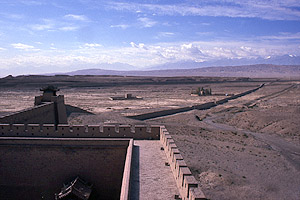
(Jiayuguan, Gansu, China)
In the morning we went to Jiayuguan Fort. It is quite an important site effectively at the end of the Great Wall it served for a long time as the last gate between civilised China to the East and the wilderness and desert of the west. Jiayuguan also has a very strategic position in a quite narrow part of the Hexi corridor sandwiched between two mountain ranges. From its watchtowers you can see the approach of any invading army and dispatch troops to defend the wall which here runs North South between the two mountain ranges. The only problem with the fort is the fact that it is heavily restored, nevertheless it is still impressive and there are good views in all directions as you walk round the battlements.
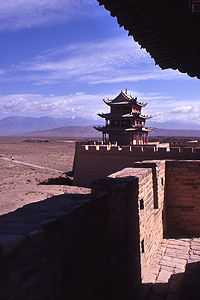
(Jiayuguan, Gansu, China)
In the afternoon we were a bit stuck for something to do, we should have really visited the fort the evening before and got on a bus that morning. However we killed an hour visiting the Great Wall Museum which consisted of displays of out of focus shots of the wall at various point along the wall, lots of explanation in Chinese text and a couple of cross sections of the wall to show how it was built.
That evening we went back to the same restaurant we had been the night before. When it came to ordering we were a little bit unsure what to do. Our phrase book had a pretty acceptable list of dishes however the night before we had got jealous looking around the restaurant as everyone else seemed to order dishes which looked a lot more exciting than ours. We therefore took a bit of a gamble and after a bit of struggling managed to produce the phrase "What do you recommend?" from our book. The waitress looked at us at first as if we were mad but then on repeating it she seemed to have a brain wave and scurried off to the kitchen. We waited in anticipation but imagine our disappointment when it came out and it was.... beef in black bean sauce followed by chicken and cashews. We concluded that it was unheard to ask the waiter their opinion so they had just remembered what we had the night before and served this for us again!!
Thursday, 6 August 1998
Jiayuguan, Gansu, China
We hopped on a bus at 0630 bound for Wuwei. There are two silk road towns in the Hexi corridor after Jiayuguan, Zhangye and Wuwei but we gambled on them being pretty much like the first and so aimed to get to Lanzhou that night, theoretically a fifteen hour journey. The first ten hours were very pleasant, we were on a remarkably relaxed bus with no shouting, only one stop and a reasonable speed. The Hexi corridor, a strip of land between two mountain ranges which at places narrows to fifteen km, is not as impressive as the name conjured up. One nice feature after Zhangye was the Great Wall which at points runs along the highway. Here we saw it in its unrestored form, basically a crumbling mud and straw wall about two and half metres high. Every so often we would see small watchtowers and a few other structures.
The problems began with the second bus. Theoretically the distance between Wuwei and Lanzhou is not that great and should be done in five hours. The bus started half an hour late and then was delayed by a police checkpoint where they shouted at us until we showed them the state insurance certificate we had to by with the bus ticket - which I think disappointed them. Then we managed to get an hour's good driving in before the bus slowed to a snail's pace to crawl up a hill. At 2315 we pulled over and were told that it was in fact dinner time and not being hungry we were forced to wait an hour whilst the bus driver first ate then dozed off. The bus finally reached Lanzhou at 0200, three hours later than we thought it would. We fortunately were dropped quite close to a hotel and woke everyone up including a half asleep receptionist who took more than thirty minutes to check us in.
Friday, 7 August 1998
Xi'an, Shaanxi, China
Naturally we slept in and when we emerged just before lunch were not well equipped to deal with the task of getting from Lanzhou to Xi'an. We were caught out by the bank being closed for two hours at lunch and with the hotel refusing to store our luggage we could not explore that much. So we were basically forced to wait around all day and finally boarded a hard sleeper coach on the Xi'an train at 1800. The conditions on board were very good and the people not a bit intrusive or stupid and apart from the price it was a much better way to travel than the bus.
Saturday, 8 August 1998
Xi'an, Shaanxi, China
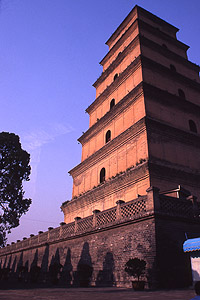
(Xi'an, Shaanxi, China)
Waking up on the outskirts of Xi'an I realised we were in a totally different landscape. Gone were the dull featureless plains of Gansu province to be replaced by fields of crops scattered with trees and broken by low red loess cliffs on top of which were yet more crops. Xi'an itself was a little confusing at first but the city walls are a very big aid to navigation and we soon realised that our taxi driver had no clue how to get where we were going so we jumped out and walked. Walking into the Flats of Renmin Hotel at around 0900 we ran into Toni, a Spanish guy who we had first met in Dunhuang and had beaten us to Xi'an by about a day by taking the train. We dumped our stuff and went to explore the city.
If I had any preconceptions about China still being in the grip of Communism these would have been shattered by a visit to Dong Dajie - Xi'an's answer to Oxford Street. As it was I was still taken aback by how western it all looked, fast food joints, electronics shops and scores of fashionable clothes shops including a handful of Western labels. We went to a street market, had lunch and generally mooched around.
Later in the afternoon we visited the Small Wild Goose Pagoda. Situated in the grounds of a Buddhist monastery the pagoda was built to house translations of the Buddhist sutras brought back from India in an epic journey described in the classic "Voyage to the West" or, as it more widely know in the west, the TV series "Monkey!". Anyway the Chinese did their usual trick of charging us as much as they possibly could, entrance fee first then an additional fee to get into the pagoda. We took one look at the pagoda, 60m tall, and one look at our legs and decided that it was not worth it so hung around in the gardens of the monastery.
When we finally got back to the hotel we went for dinner. Here we uncovered a bizarre little war that goes on just outside the hotel doors. Basically our hotel was in the middle of nowhere. So the two restaurants opposite, Mum's and Dad's, are totally reliant on backpackers for custom. There is little to separate them, they both have English menus and serve pretty bad Chinese dishes. So in order to increase their share of the customers they employ girls to stand outside the restaurant and wave at anyone who dares to exit the hotel. Currently Mum's seems to have the upper hand for the sole reason that it is about five metres closer to the hotel and its success has meant that it has been able to go a little more up market, it has tablecloths.
Sunday, 9 August 1998
Xi'an, Shaanxi, China
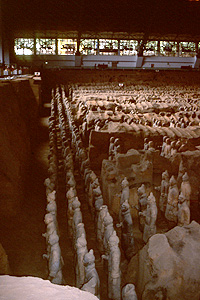
(Xi'an, Shaanxi, China)
We woke up not desperately early due to the fact that reunited with Toni we had stayed up drinking and chatting about how the Chinese treat tourists well into the night. We then set off for the Terracotta Army not on the hotel's own tour but under our own steam. The tourist minibuses to Xi'an at the train station gave us some insight into how Chinese tourists are treated. There were loads of minibuses plying the same route but since none of them would leave until full they all fought viciously for the same customers. We were shouted and cajoled into a bus which was bad enough, the Chinese however were physically being forced into buses. Everywhere there were what looked like fights breaking out but were in fact forceful sales pitches. Anyway our bus eventually filled and we were off.
The Terracotta Army is one of those wonders that is hard to describe. We have all seen photos of it and realised that there are a lot of figures, we have also seen close-ups and realised that the figures are detailed. However it is not until you are there that the two come together and you see that you are in a hall with thousands of regimented sculptures each very detailed, each with a unique facial expression... its one of those things that you have to be there to understand.
After coming out of the third hall the heavens opened up and we were forced to take refuge in the eateries. Here we encountered a new swindle, charging you 25¥ for a 2¥ bowl of noodles. Fortunately we argued our way out this time, explaining that if he did not come up with a more reasonable price we would remain seated and warn other customers away. This and a bit of shouting worked and we managed to walk off leaving a fraction of what he had asked but still more than he deserved.
The evening's big event was Anna finding out that she had passed her recent teacher training course with two A's so we went out for a slap-up meal of Beijing duck.
Monday, 10 August 1998
Xi'an, Shaanxi, China
Another non-tourist bus outing this time to Famen Si. This temple is home to three of Buddha's fingers - King Ashoka of India decided in repentance for his warlike past to distribute relics of the Buddha Sakyamuni to eight Buddhist monasteries outside of India. These relics were of great importance in the Tang Dynasty but were gradually forgotten about and the secret underground vault where they were kept was forgotten about. That is until in the early 1980's the pagoda sitting on top of the vault partially collapsed and the work to rebuild it uncovered an amazing treasure chamber of gold and silver including "pass-the-parcel" parcels of iron, silver, gold and crystal boxes enclosing the famous digits.
Well that's the history, the reality is a pretty nice monastery, a well-laid out museum and an amazing collection of things. We paid the different entrance fees, walked around, had lunch then returned to Xi'an. That night we almost ate at Dad's but got so frightened by the look of other people's food that we headed back into town and managed to get charged double price for a beer, although the food was excellent.
Tuesday, 11 August 1998
Tianshui, Gansu, China
Having checked out of the hotel the first thing we had to do was to arrange our train tickets to Tianshui, halfway back to Lanzhou in Gansu province. This proved not too difficult with a special foreigners desk sorting the majority of things out. Whilst queuing we ran into a Canadian couple who we had provided directions to a couple of days before. It turned out that they had had enough, the rudeness of the Chinese plus the fact that so little English was spoken meant that they wanted to return to civilised Beijing, where they had come from, and spend the remainder of their month's holiday there. Instead however they had got themselves booked on a hard-seat to Chengdu (there were no sleepers) and thus had signed up for sixteen hours of sitting on a bench in order to escape. It sort of made us feel good because although we had harboured similar thoughts and several incidents had pissed us off extremely we had never reached "the wanting to leave" stage and so must be quite hardened travellers by now, either that or not so fussy.
The train they decided to put us on was not leaving for two hours so we went on another spending spree - this time picking up an English translation of the aforementioned "Voyage to the West" which we hoped would take me longer to wade through than everything else that we had bought or swapped so far which lasted on average a day. The train ride to Tianshui was amazing the train line cuts a path through a classic Chinese landscape of steep red hills covered with vegetation in all but those places where they are to steep. We got through the journey without incident and got to Tianshui at a reasonable time to check-in and have a market dinner.
Wednesday, 12 August 1998
Tianshui, Gansu, China
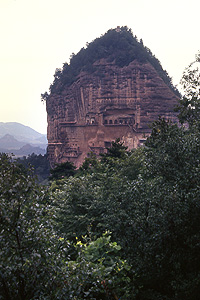
(Tianshui, Gansu, China)
From Tianshui the thing to see is Maijishan. Like the Mogao caves it is a silk road era set of Buddhist cave carvings, unlike Mogao its setting is spectacular, perched on the face of an almost vertical rocks that soars out of the surrounding landscape. In order to see the carvings you have to scramble around on a set of walkways hundreds of metres in the air and what is more you have no guide to force an order upon you, just the odd locked gate.
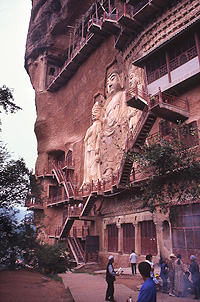
(Tianshui, Gansu, China)
After exploring the caves we attempted to have a walk in the surrounding area which was just as picturesque. Sadly the Chinese had implemented a monster pricing scheme, not only did you have to pay to get into the "scenic area" then pay more to get into the caves they had also set up gateways at convenient intervals to charge you more to walk around. We threw up our hands at this and decided that whatever it was that lay beyond the gate we were not paying. In the end we found a pretty nice alternative and explored several free side paths. We had the whole of a valley encircled by red sandstone cliffs to ourselves and hundreds of butterflies and eventually found our way to a saddle between two peaks where we worked on our diaries.
Thursday, 13 August 1998
Tianshui, Gansu, China
We found a train ticket for Lanzhou pretty easily but the range of prices according to what time you wanted to travel was amazing and so we had ended leaving at 1130 on what turned out to be a very slow train. One problem was that Tianshui was not the starting point for any trains and I think this meant that you could not reserve seat as we had done on the way here. Now when we got to the train station I expected there to be a fair amount of shoving and pushing but was initially surprised, it was all very orderly and we even queued up for each carriage in a little line on the platform.
Sadly it was all just a pretence. The head of our queue ended up halfway along a carriage so the line just broke as everyone bolted for the door. We were carried along in the tide and were able to observe that whilst some people tried to jostle their way in through the doors other people climbed in through the windows. We finally popped through the carriage door, the rucksacks providing a fair degree of protection, to find that there were hundreds of free seats and there really should not have been so much fuss.
The ride was nowhere near as scenic as that from Xi'an but the landscape was interesting for its loess plateaus, formed where the rivers literally cut through the red soil like a knife through butter. On top of each of these plateaus were green fields and in general every available surface had been carefully contoured for agriculture. When we got to Lanzhou it was like returning home - merely because we had been there once before and knew our way to the hotel and bed.
Friday, 14 August 1998
Lanzhou, Gansu, China
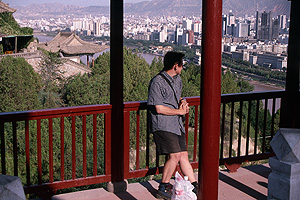
(Lanzhou, Gansu, China)
Our day in Lanzhou was confused, we were waiting for a parcel from my parents and were totally taken aback to find that it had already arrived. We decided to go to Xiahe the next morning and had a lot of running around to do to prepare for this. It was not until the afternoon that we finally had the chance to check out the Yellow River, which was chocolate brown, and take a cable car over it up to Baita Shan park which overlooks the city.
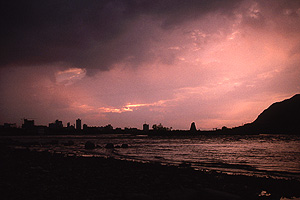
(Lanzhou, Gansu, China)
The bit of the park that we visited was more like an endless sequence of cafes set in tree fringed pagodas. Eventually however we found the white pagoda, for which the park is named, and had a lengthy look around it before relaxing in a cafe that really did have a panoramic view of both the river and the city. From so high up Lanzhou looks like the computer game Sim City. It has so many new high rise buildings and there is so much construction going on that you can almost see the city growing skywards. I wondered what it was that was fuelling such a rapid growth of the city and if, with the ongoing Asian crisis, it would end up like London after the boom of the late 80's - a city with enough spare floor space to accommodate a smaller city.
Saturday, 15 August 1998
Xiahe, Gansu, China
Our arrival at the bus station was closely followed by two shocks. One that there were a hell of a lot of tourists going to Xiahe and two that, according to the Lonely Planet of two of these tourists, we would not be able to progress into Sichuan without a travel permit. We put the second of these things into storage until we could fully investigate the rumour and just marvelled at the first. Once our bus had finally got underway, after a seating argument that resulted in the bus being emptied and repopulated, we realised that ours was not the only bus as well. At least a dozen more tour buses overtook us on the way there quickly dispelling our belief that the monastery town would be a quiet place to relax and worrying us that we would not get a room.
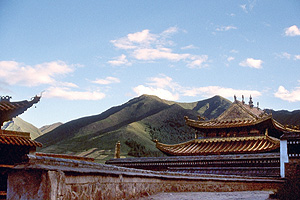
(Xiahe, Gansu, China)
The drive up there was nevertheless very nice and as we approached Xiahe the scenery was spectacular, valleys with clear mountain streams trickling through them and small Tibetan communities each one with its own stupa. When we got there however it became quickly apparent that Xiahe was not quite as small and scores of motor-rickshaw drivers accosted us as we got out of the bus offering to take us to the Labrang Hotel - which was suspiciously the one that all the guide books recommend. I picked out a driver and we knocked him down to a reasonable price and we set off. As we drove the entire length of the town we encountered other rickshaws stuffed with western tourists heading in the same direction and a sort of race ensued much to the disadvantage of several monks who were nearly knocked down trying to cross the road. Rather predictably the hotel was completely booked out, and being isolated out to the far west of the town all seven of us had no choice but to return to the bus station area, by a strange coincidence the taxi drivers were still waiting for us with more hotel suggestions...
For the first time on our trip we had to take beds in dormitories the inconvenience of which was doubled by the fact that we had to be separated, Anna into a girl's dorm and me into a four bed boy's room. This arrangement was actually policed by the floor attendant and it was only with some persuasion that we managed to have a cup of tea together in my room just before bed time.
Sunday, 16 August 1998
Xiahe, Gansu, China
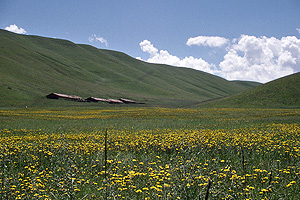
(Xiahe, Gansu, China)
We woke up early, failed to find any milk or any kind of serviceable breakfast then hired a couple of bikes. We then headed up the valley, in the same direction as an alarming number of tour buses, towards the Sangke grasslands. Once out of the over touristy Xiahe cycle was very pleasant. For kilometres we followed the course of a stream through the fairly steep sided valley. At the top of the stream we found the reason for the tour buses, there was a huge lake besides which was a "village" that had transformed itself into a circus. We avoided it and the horse rides and carried on by the side of the grasslands for about a kilometres then turned back and spent an hour reading by the side of the stream.
On the way back we stopped at the Labrang hotel - although we had now transferred to a double it was clear that the shower was not going to work and we still loved the location of the Labrang. The girl at reception said yes, they had doubles for 120 so we said we would turn up tomorrow. Back in town Anna started to feel ill so we spent most of the day playing cards in a small canteen filled with curious off duty monks.
Monday, 17 August 1998
Xiahe, Gansu, China
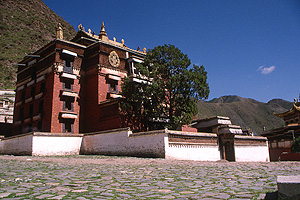
(Xiahe, Gansu, China)
Having got thoroughly sick of not being able to get a shower we decided to shift hotels. We leapt in a taxi at eight and stormed over to the Labrang hotel. Here the manager was on reception and I asked him for a double room he said there weren't any a little too quickly so I said that yesterday there had been some free. Amazingly he suggested that I should go around to the rooms ad check if there were any free. I did this, a little bemused, but nevertheless keen to get a room and go for a walk. Whilst I was gone Anna, who was pretty sick of the manager, told him that it was his job to check - he told her in reply that she wasn't ever going to get a room in his hotel. This was I guess the nail in the coffin for Xiahe, the basic mood was we have plenty of tour groups and plenty of money coming in, so why should we bother with the independent tourist.
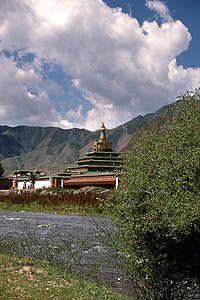
(Xiahe, Gansu, China)
After storming out we decided that we had better see the Labrang Monastery, again we encountered the same attitude, the monks did not want to tell us anything, all the building doors were closed to anyone not in a guided tour etc. We found out later from a western Chinese speaker that the monks had a few years ago been very friendly to the small trickle of tourists who found there way there but with the coming of the huge Chinese weekend tours they had been ordered to open the monastery up to hordes of noisy Chinese who take pictures of anything, however sacred, and since then a lot of them have harboured a great resentment towards tourists.
If the hotel business was the last nail in the coffin this was its headstone. Anna had already decided that she wanted to go and finding out that whatever time we left we would have to spend the night in the next stop down the line Hezuo, made my mind up as well. After a nice lunch we jumped on the bus to Hezuo and once there located a hotel, washed and then went to bed quite pleased with the fact that we had escaped from a horrific tourist trap.
Tuesday, 18 August 1998
Langmusi, Gansu, China
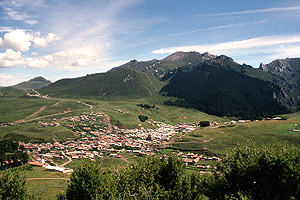
(Langmusi, Gansu, China)
The bus ride from Hezuo to Langmusi was a bit of an ordeal. Having found out the night before that the fare would be fifteen yuan we were not best pleased when the ugliest conductor in the whole of China decided we should pay thirty yuan. Fortunately another English guy, Sam, a VSO teaching in Guizhou was on our bus had exactly the same problem despite his foreign expert's card and his knowledge of Chinese. Having gone one round with us the conductor decided to make a big show of taking thirty off a couple of the passengers, still we didn't budge. After this he tried to wear us down by repeating "give me" over and over again and tugging at our jackets. This went on for nearly three hours with the occasional relief, the odd eruption into shouting and the odd foray into violence.
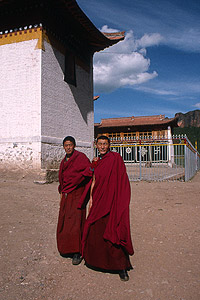
(Langmusi, Gansu, China)
Fortunately a couple of monks were also travelling on the bus and one of these earned the unique title of being the only person to stand up for us in China. Every time Mr Ugly started to get really physical the monk would restrain him. He also spurred us on by giving me the nod once when I was insisting that the fare was fifteen, offering us pears and on the odd occasion laughing with us at the conductor's antics. The other passengers on the bus were as spineless as rotten fruit - when asked they would agree with the conductor. Finally the conductor lost some face and agreed on a price of twenty, we felt like we had won WWIII but in truth we had a rotten journey and for very little because he went on to extort double the price from the next set of people the following day.
When we arrived at Langmusi it was like being delivered to heaven, beautiful mountainous scenery ranging from red sandstone, wild-west style, cliffs to jagged limestone peaks covered in pines. We dropped our bags at the hotel then walked over to Lesha's cafe. Here we had the best apple pie in the universe and met three British travellers and amazingly Nick, a Dutch guy who we had travelled from Sost to Kashgar with and who we left battling with the Internet in John's cafe. After a good chat we went to explore Langmusi.
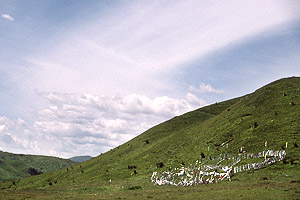
(Langmusi, Gansu, China)
One of the two must-sees in the town is the sky burial site. I had my reservations that it would be a bit more gruesome than Anna was bargaining for but after twenty minutes walk we saw a square of prayer flags on a hillside and approached. About twenty metres from the flags my worst fears were realised, we first spotted a small section of spinal cord and then a leg bone. Getting nearer the density of bones increased as did our unease. We got as far as an area where a body had at some point been tied to the ground with ropes for the birds to peck at, there was nothing more than caps of clothes, and decided we had had enough. Trying to get out was a tricky operation. Everywhere you went you would encounter skulls, pelvises, leg bones etc. The bones had been spread over a huge area, presumably by vultures and it took us a while to get to less skeletal ground.
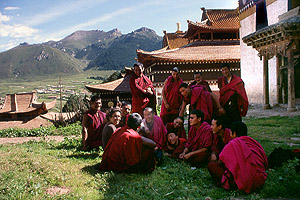
(Langmusi, Gansu, China)
Returning to town we took a path along a ridge above one of the town's monasteries. Seeing us some monks waved at us to come down. They were sitting in a circle in the shade of one of the monastery buildings and we sat down in their midst. They were very friendly and very inquisitive, trying on our sunglasses, inspecting watches, clothes etc. it was all we could do to stop them emptying our bags and examining everything in them as well. We had a very basic conversation and after half an hour they took us to see some monks blowing the Tonche - a sort of metal alpine horn. After we left I couldn't help comparing these friendly and curious monks with the unfriendly ones we had encountered in Xiahe whose curiosity was only aroused by the Kung-fu movies shown in the town's cafes.
Coming back to Lesha's cafe for an excellent dinner we found ourselves in the midst of a great debate. It appeared that the bus to Songpan was at the best unreliable and the majority of people undertaking the trip were doing so by jeep. In addition the guaranteed double pricing and an overnight stay in Zoige meant that the cost was only a fraction more. Nick, the three British people and a Swiss couple were due to leave the next day, however feeling so at home we decided that at the very least we were going to stay another day.
Wednesday, 19 August 1998
Langmusi, Gansu, China
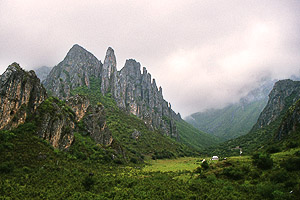
(Langmusi, Gansu, China)
The second must see in Langmusi is the Gorge walk. After my second apple pie in ten hours we equipped ourselves for the impending rain and walked through the town towards the other large monastery. Here we saw some of the classes of the children studying at the monastery and some water powered prayer wheels. We carried on past this to the monk's swimming pool, basically a pool created by the damming of the stream flowing down the gorge. Carrying on up into the gorge our breath was taken away at nearly every turn by the steep limestone scenery which was encased by the clouds which were by now raining on us. After about an hour we reached a small grassland and some tents but the rain was building up so we turned back rather than explore a bit more.
The rain gradually got worse and worse so that by the time we got back to town we were soaked and the main street looked more like a river of mud. We changed into some dry clothes and weathered the remainder of the day out in Lesha's cafe watching as the number off British people arriving in town reached monumental proportions (about ten). I began to wonder if there was something so horrific about the Lanzhou to Chengdu road that only the crazy would be attracted to it.
Over dinner and beers the conversation was varied to say the least. There were four English teachers working for the VSO passing through who naturally had quite a bit of experience of the Chinese. I asked them whether they thought that the nature of Chinese people on the whole, taking as an example the fact that they side with authority, was as a result of Mao and Communism or was something endemic in the race. The funny thing was that even after two or more years they could not separate the two, it was as if the past has been erased or is not accessible to westerners.
They told us many stories the saddest has to be that of a long distance bus in Xinjiang on which two Czechs saw a Uyghur having a seizure as they went over a mountain pass. The Czechs thought that the whole situation had been dealt with but all that happened was that when the guy went into a coma they put him back in his seat and he died on the way to Urumqi. In Urumqi they just took the dead body out of the bus and placed it in the bus station - in China the onus is on the family to ferry their dead to somewhere more respectable. We finally turned in at 11 because the owners of the cafe actually slept on the sofas where we ate.
Thursday, 20 August 1998
Langmusi, Gansu, China
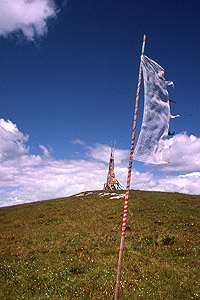
(Langmusi, Gansu, China)
After rain for most of the previous day we were blessed by sunshine for the whole of Thursday. We decided to go on a walk to the top of some red cliffs that overlooked Langmusi. Fortunately the monks in Langmusi follow the tradition of putting prayer flags on the top of any bump they can find. Because of this the path up was quite well trodden and with a bit of effort we got to the top. Here the view was amazing, you got a real feel for how isolated the community was, as well as seeing the amazing contrast between the wedges of red sandstone almost like sand dunes and the limestone crags of the gorge. On the top of the sandstone cliffs the ground sloped away gently playing host to an alpine meadow packed with hundreds of species of flower some of which Anna pressed.
After we had got attacked by insects at one spot we moved onto a fairly windy saddle above a cusp in the cliffs. Here it was so isolated that for the first time in China we sunbathed and filled in our diaries. We stayed for at least an hour and then set off again walking the full length of the cliffs and then taking a rather roundabout route through the grasslands to the back of the monastery.
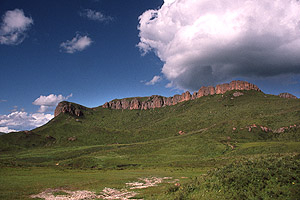
(Langmusi, Gansu, China)
The evening was taken up with an unsuccessful attempt to tape the Tibetan monks chanting and an equally unsuccessful attempt, it turned out, to procure a jeep to Songpan. The story here was that the buses were such that you could not make Songpan in a day and that a stop in a rather unpromising place by the name of Zoige was called for. This coupled with double bus fares meant that it was nearly as cheap to commandeer a jeep between four and a lot less hassle. Sadly there was something strange going on in the village and no-one seemed willing to do the journey for the going rate and everyone that spoke English suggested taking the bus. In the end we found somebody that said they would take us but they failed to turn up the next morning.




